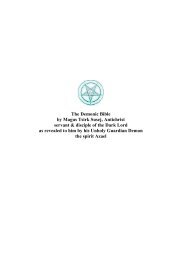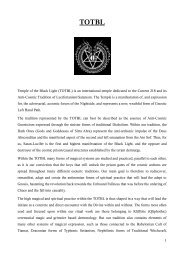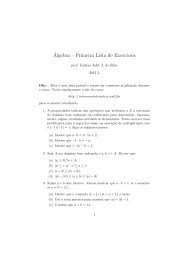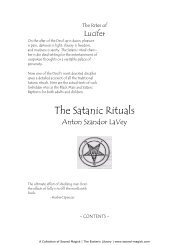Satanism Today - An Encyclopedia of Religion, Folklore and Popular ...
Satanism Today - An Encyclopedia of Religion, Folklore and Popular ...
Satanism Today - An Encyclopedia of Religion, Folklore and Popular ...
Create successful ePaper yourself
Turn your PDF publications into a flip-book with our unique Google optimized e-Paper software.
Appendix III: Satanist Survey 331<br />
respondents what they thought <strong>of</strong> other religions. As<br />
one would anticipate, some Satanists denounced theistic<br />
religion outright as a “hoax” <strong>and</strong> a “folly.” More than<br />
a few, however, begrudgingly acknowledged other religions’<br />
right to exist, for example: “I accept people who<br />
really believe in something (even if it is damn<br />
Christianity).” In this same vein, other respondents<br />
noted: “I don’t have as much <strong>of</strong> a problem with some<br />
Christians as I do with Christianity. To me, Christianity<br />
is a money-making business, nothing more.”<br />
“Christianity is a good faith. Works wonders for a lot <strong>of</strong><br />
people. Occupies their life, makes them feel better about<br />
their pathetic lives. I have nothing against it, really.”<br />
The majority <strong>of</strong> respondents, however, were less<br />
negative, although their views exhibited a wide range <strong>of</strong><br />
opinion. This spectrum can best be illustrated by examining<br />
a set <strong>of</strong> short citations from a series <strong>of</strong> different<br />
questionnaire responses:<br />
I am ambivalent...Needless to say, I disagree with<br />
many tenets <strong>of</strong> Christianity. But I see that as<br />
secondary to our interaction as mature human<br />
beings.<br />
I think Christianity, in <strong>and</strong> <strong>of</strong> itself, is a “nice” religion,<br />
[though it has some] psychologically<br />
damaging doctrines.<br />
All religions are fine. It’s certain PEOPLE IN those religions<br />
or LEADERS . . . that cause the problems.<br />
Other religions are composed <strong>of</strong> mostly good people<br />
who are simply trying to find their own way in<br />
the world.<br />
I’m glad there are many religions out there because<br />
religion is not a one size fits all thing.<br />
If we make the (admittedly problematic) inference<br />
that this pattern <strong>of</strong> responses is representative <strong>of</strong> the<br />
larger Satanist community, it radically undercuts the<br />
common stereotype that all or even the majority <strong>of</strong><br />
Satanists hate Christians <strong>and</strong> Christianity. It also flies in<br />
the face <strong>of</strong> the casual assumption that all or most<br />
people become Satanists in reaction to the Christian<br />
tradition.<br />
It should further be noted that, as reflected in the<br />
thoughtfulness <strong>of</strong> many <strong>of</strong> the above responses, Satanists<br />
tend to be more intellectual than average. The finding<br />
that most became involved as a result <strong>of</strong> reading, for<br />
instance, indicates that they read more than the typical<br />
citizen (e.g., most adult Americans read an average <strong>of</strong><br />
one book per year or less). They are also freethinkers,<br />
who, far from dropping out <strong>of</strong> the political process, tend<br />
to be independent voters or supporters <strong>of</strong> third parties.<br />
Religiously, whether or not they are formal members<br />
<strong>of</strong> the Church <strong>of</strong> Satan, <strong>An</strong>ton LaVey’s particular formulation<br />
is a central if not the central component in most<br />
Satanist thinking. This is especially true with respect to<br />
conceptions <strong>of</strong> Satan <strong>and</strong> magic.<br />
Finally, many Satanists (or at least those who<br />
responded to the questionnaire) are primarily Internet<br />
Satanists. This is at least partially because <strong>of</strong> the “scattered”<br />
geographical distribution <strong>of</strong> Satanists, although,<br />
according to my contacts, the marked individualism <strong>of</strong><br />
modern Satanists—which mitigates against close group<br />
work—is also a factor.<br />
The Enduring Influence <strong>of</strong> <strong>An</strong>ton LaVey<br />
Before I began collecting questionnaire data, I had<br />
received the impression from perusing relevant<br />
websites that contemporary <strong>Satanism</strong> had developed in<br />
different directions from the specific formulation<br />
developed by <strong>An</strong>ton LaVey in the 1960s. In particular, it<br />
appeared to me that many contemporary Satanists had<br />
moved to a position <strong>of</strong> regarding Satan as a conscious<br />
being. I was thus surprised to discover that LaVey’s<br />
humanistic approach—which rejects the real existence<br />
<strong>of</strong> personal spiritual beings, diabolical or otherwise—<br />
was the dominant form <strong>of</strong> <strong>Satanism</strong> pr<strong>of</strong>essed by<br />
respondents.<br />
At least part <strong>of</strong> the reason for this state <strong>of</strong> affairs<br />
appears to be the pervasive influence <strong>of</strong> <strong>An</strong>ton LaVey’s<br />
Satanic Bible (SB). A full 20 percent <strong>of</strong> respondents<br />
explicitly noted the SB as the single most important<br />
factor attracting them to <strong>Satanism</strong>. It also seems likely<br />
that this book played a major role in the “conversion” <strong>of</strong><br />
other Satanists in my sample. In response to a questionnaire<br />
item asking how they became involved, a number<br />
<strong>of</strong> people simply wrote, “I read the Satanic Bible.” One<br />
respondent elaborated by noting that she had been a<br />
Satanist in her “heart first, but I couldn’t put a name to<br />
it; then I found the Satanic Bible.” One <strong>of</strong> the more interesting<br />
<strong>of</strong> these responses was another individual who<br />
wrote, “My step-father used to be a Christian preacher.<br />
After being told my choices in clothing, music, art,<br />
poetry, etc. were Satanic, I decided to buy the Satanic<br />
Bible to see if it was as bad as he made it out to be.” This<br />
respondent subsequently became a Satanist.<br />
LaVey’s influential publication was also referred to<br />
a number <strong>of</strong> times in response to other questionnaire<br />
items. For example, one person noted that, “because I<br />
agree with <strong>and</strong> practice the majority <strong>of</strong> the beliefs set<br />
forth in The Satanic Bible <strong>and</strong> other works <strong>of</strong> Dr.<br />
LaVey, I VERY MUCH consider myself just as valid a<br />
Satanist as any ‘<strong>of</strong>ficial’ priest.” <strong>An</strong>other respondent<br />
wrote, “Satan is merely a word, a representative<br />
concept that encompasses all that the Satanic Bible<br />
teaches.” <strong>An</strong>d yet another individual stated: “To me,<br />
Satan is the personification <strong>of</strong> mankind’s carnal<br />
nature. More information can be found in The Satanic<br />
Bible by <strong>An</strong>ton Sz<strong>and</strong>or LaVey.”<br />
It thus appears that the SB is a doctrinal touchstone<br />
for many—though certainly not all—participants in this<br />
movement, despite the fact that the majority <strong>of</strong> contemporary<br />
Satanists are not formal members <strong>of</strong> <strong>An</strong>ton
















